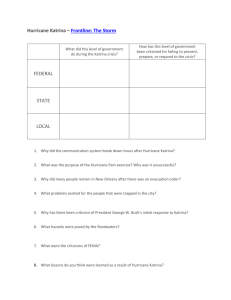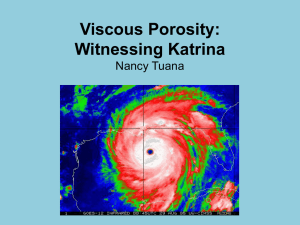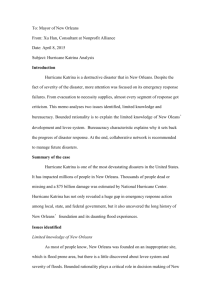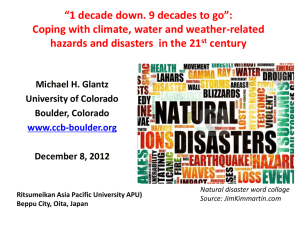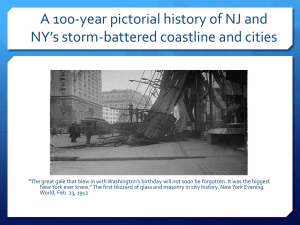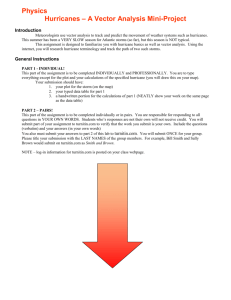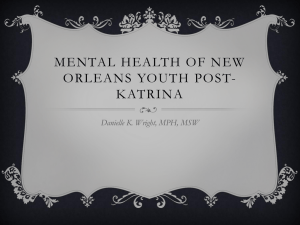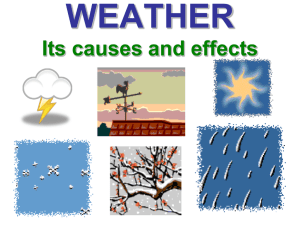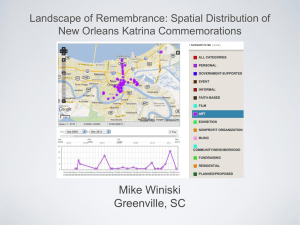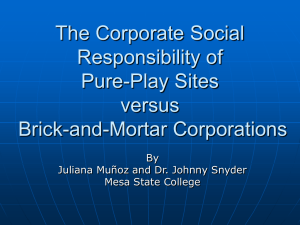Jennifer Leaning, MD, SMH
advertisement
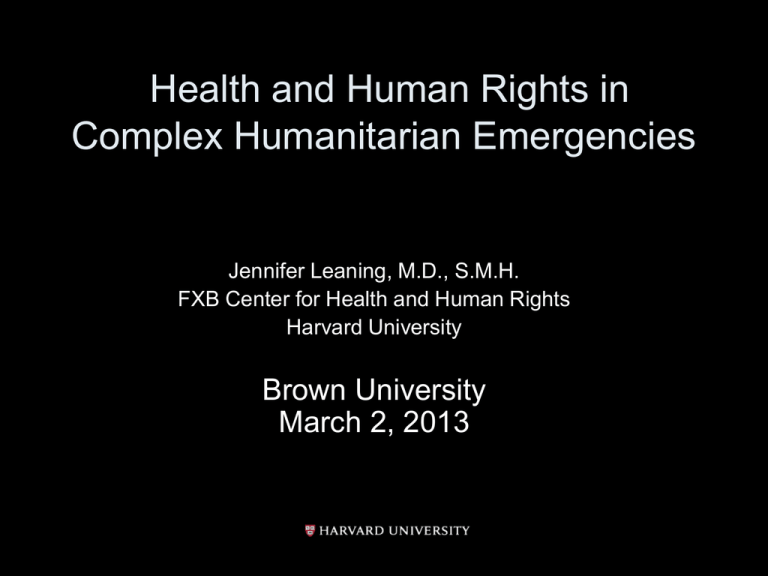
Health and Human Rights in Complex Humanitarian Emergencies Jennifer Leaning, M.D., S.M.H. FXB Center for Health and Human Rights Harvard University Brown University March 2, 2013 Outline • Forced movement of people as common element in armed conflict and natural disaster • International norms that apply to armed conflict and crisis-induced forced migration • Major issues of health and human rights in complex emergencies • Examples Forced Migration in Conflict and Disaster • Creates emergency needs – Water, shelter health,food, security • Imposes new categories of vulnerability – Raises risk of gender-based violence • Requires temporary settlement that may last for decades • Inflicts loss of family and community, livelihoods, culture, history Legal Rights and Norms in CHEs • International human rights law – Rights to life, home, property, freedom of movement, dignity, protection against torture and assault • International humanitarian law – Obligations to distinguish civilians from combatants and protect civilians from harm • Sphere standards CHEs: Armed Conflict • Conflicts 1990-2010 – – – – Number ranges from 18-33 per year Majority in Africa and Asia Majority last for many years Number of internally displaced persons greater than number of refugees – Forced migration from war is now a prevalent feature – Characterized by massive violations of human rights and IHL • Targets are civilians Examples • Wars – Yugoslavia 1992-95 – Darfur 2003 to present – Post conflict Afghanistan and Angola • Disasters – Hurricane Katrina August 29, 2005 Number of Refugees vs. IDPs over Time High Costs of Conflict: Civilian Victims of War WWI WWII 1946-today War in Former Yugoslavia 1992-95 • Estimates of 200,000 killed • Hundreds of thousands displaced in campaigns of ethnic terror and ethnic cleansing • Large camps of IDPs and self settled in towns • Concentration camps • Wide-scale rape • Forced migration War in Former Yugoslavia • Hundreds of thousands displaced in campaigns of ethnic terror and ethnic cleansing • Large camps of IDPs and self settled in towns • UN required to participate in creating more homogenous populations in order to reduce killings and assault Sarajevo 1992-96 Bosnia 1992 13 Bosnia 1993-94 Bosnia 1993-94 War in Darfur 2003-present • Demands for regional autonomy and voice • Armed Darfuri militias attacked Sudanese outposts • Aggressive state and militia-based reprisal • Campaign of terror and destruction of villages and community • Catapulted over 2.5 million into IDP status and 400,000 refugees in Chad Darfur 2004 Darfur 2005 Darfur 2004 Darfur 2004 Darfur 2004 Darfur 2004 Darfur 2005 Post-Conflict Afghanistan 2002 Post-Conflict Afghanistan 2002 Post-Conflict Afghanistan 2002 Post-Conflict Angola 2007 Post-Conflict Angola 2007 Post-Conflict Angola 2007 Natural Disasters • Weather instability, powerful hurricanes/cyclones, disruptions in monsoons and seasonal rains • Coastal and riverine flooding • Flood induced mountain collapse • Sea level rise • Water scarcity, drought, food insecurity, drought, famine Natural Disasters • Increased intensity and frequency of major water-related natural disasters • Increasingly important factor in forced migration • Probably mediated through population growth and settlement patterns as well as through secular environmental change and climate change Number of Disasters over Time Hurricane Katrina • Major category 3 hit very close to New Orleans, LA August 29, 2005 • City of 485,000 on US Gulf Coast with one road north for evacuation • Disaster resulted in rapid forced migration within and then out of the city • Underlying racial and socio-economic fissures • As of 2010, only 345,000 have returned Hurricane Katrina 8/26/05 Hurricane Katrina 8/28/05 Hurricane Katrina 8/29/05 Hurricane Katrina 8/30/05 Hurricane Katrina 8/30-31/05 Hurricane Katrina 8/31/05 Hurricane Katrina 8/31/05 - 9/1/05 Hurricane Katrina 9/1/05 Hurricane Katrina Health and Human Rights in War and Disaster (CHEs) • All follow discernible patterns of onset and escalation • All precipitate forced migration • All inflict suffering on individuals and civilian populations • All impose loss of family and community, livelihoods, culture, history Health and Human Rights in War and Disaster (CHEs) • • • • • • Dynamics differ greatly But all are very difficult to stop once begun All with significant health impacts All laced with significant human rights violations These impacts and violations are tightly linked Emphasis must be on early prevention and mitigation
